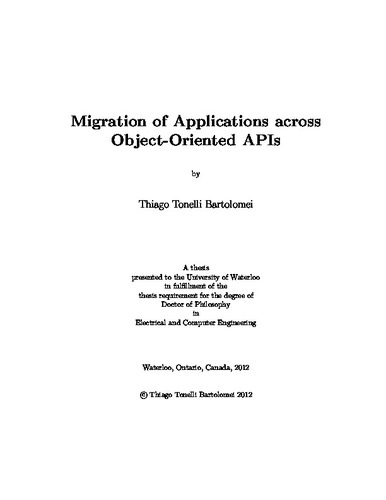| dc.contributor.author | Tonelli Bartolomei, Thiago | |
| dc.date.accessioned | 2012-08-31 13:37:47 (GMT) | |
| dc.date.available | 2012-08-31 13:37:47 (GMT) | |
| dc.date.issued | 2012-08-31T13:37:47Z | |
| dc.date.submitted | 2012 | |
| dc.identifier.uri | http://hdl.handle.net/10012/6948 | |
| dc.description.abstract | Software developers often encapsulate reusable code as Application Programming Interfaces (APIs). The co-evolution of applications and APIs may motivate an API migration: the replacement of application dependencies to an original API by dependencies to an alternative API that provides similar functionality and abstractions.
In this dissertation, we investigate issues associated with API migration in object-oriented systems, with special focus on wrapping approaches. We present two studies and a set of developer interviews that elicit issues in the process and techniques used in API migration in practice. The results suggest that the most pressing issues relate to discovery and specification of differences between APIs, and to assessment of migration correctness. This dissertation introduces techniques and a method to address these issues.
We propose the use of design patterns to support the specification of API wrappers. API wrapping design patterns encode solutions to common wrapping design problems. We present an initial catalog of such patterns that were abstracted from programming idioms found in existing API wrappers.
We introduce the concept of compliance testing for API migration, a form of automated testing. Compliance testing supports the discovery of behavioral differences between a wrapper and its corresponding original API, as well as assessment of wrapper correctness. Compliance testing uses API contracts and assertion tunings to explicitly capture and enforce the notion of a “good enough” wrapper that is informal in practice.
We present the Koloo method for wrapper-based API migration. The method prescribes practical steps to use compliance testing as a means to elicit the requirements for the API migration, and to assess its correctness. Koloo fits within the iterative, sample-driven general API migration process usually followed by developers in practice.
We evaluate the Koloo method in an empirical study. The subjects cover the domains of XML processing, GUI programming and bytecode engineering. The results provide evidence that Koloo is superior to alternative methods in driving the development of a wrapper that is tailored for the application under migration. The results also show that API contracts help driving the evolution of the wrapper, and assertion tuning is necessary to relax the semantics of strict equality contracts, and useful to compromise on features that are difficult to emulate perfectly. Finally, we validate that the proposed design patterns are used in practical wrappers. | en |
| dc.language.iso | en | en |
| dc.publisher | University of Waterloo | en |
| dc.subject | Software Engineering | en |
| dc.subject | Software Maintenance | en |
| dc.subject | API Migration | en |
| dc.title | Migration of Applications across Object-Oriented APIs | en |
| dc.type | Doctoral Thesis | en |
| dc.pending | false | en |
| dc.subject.program | Electrical and Computer Engineering | en |
| uws-etd.degree.department | Electrical and Computer Engineering | en |
| uws-etd.degree | Doctor of Philosophy | en |
| uws.typeOfResource | Text | en |
| uws.peerReviewStatus | Unreviewed | en |
| uws.scholarLevel | Graduate | en |

